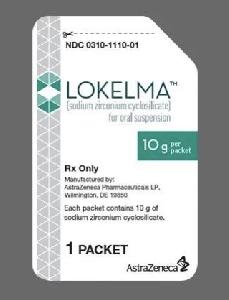Lokelma Disease Interactions
There are 2 disease interactions with Lokelma (sodium zirconium cyclosilicate).
Sodium zirconium cyclosilicate (applies to Lokelma) constipation/GI obstruction
Major Potential Hazard, Moderate plausibility. Applicable conditions: Gastrointestinal Obstruction
The use of sodium zirconium cyclosilicate should be avoided in patients with severe constipation, bowel obstruction or impaction, including abnormal postoperative bowel motility disorders. This medication has not been studied in patients with these conditions and may be ineffective and it may worsen gastrointestinal conditions.
References
- (2018) "Product Information. Lokelma (sodium zirconium cyclosilicate)." Astra-Zeneca Pharmaceuticals
Sodium zirconium cyclosilicate (applies to Lokelma) edema
Moderate Potential Hazard, Moderate plausibility. Applicable conditions: Fluid Retention, Congestive Heart Failure, Renal Dysfunction
Each 5 g dose of sodium zirconium cyclosilicate contains approximately 400 mg of sodium, and can cause edema, which was generally mild to moderate in severity in clinical trials. Patients should be monitored for signs of edema, particularly those who should restrict their sodium intake or are prone to fluid overload (e.g., heart failure or renal disease). Advise patients to adjust dietary sodium, and if appropriate, increase the dose of diuretics as needed.
References
- (2018) "Product Information. Lokelma (sodium zirconium cyclosilicate)." Astra-Zeneca Pharmaceuticals
Lokelma drug interactions
There are 18 drug interactions with Lokelma (sodium zirconium cyclosilicate).
Lokelma alcohol/food interactions
There is 1 alcohol/food interaction with Lokelma (sodium zirconium cyclosilicate).
More about Lokelma (sodium zirconium cyclosilicate)
- Lokelma consumer information
- Check interactions
- Compare alternatives
- Pricing & coupons
- Reviews (2)
- Drug images
- Side effects
- Dosage information
- Patient tips
- During pregnancy
- FDA approval history
- Drug class: cation exchange resins
- Breastfeeding
- En español
Related treatment guides
Drug Interaction Classification
| Highly clinically significant. Avoid combinations; the risk of the interaction outweighs the benefit. | |
| Moderately clinically significant. Usually avoid combinations; use it only under special circumstances. | |
| Minimally clinically significant. Minimize risk; assess risk and consider an alternative drug, take steps to circumvent the interaction risk and/or institute a monitoring plan. | |
| No interaction information available. |
Further information
Always consult your healthcare provider to ensure the information displayed on this page applies to your personal circumstances.


